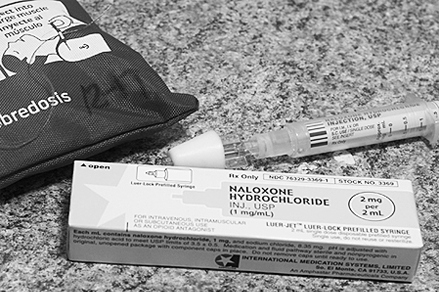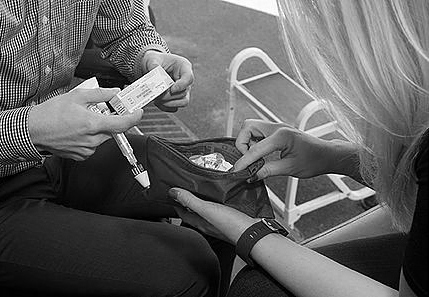Harm Reduction Services
Syringe Exchange
 |
People who inject drugs can receive new, sterile syringes as well as the supplies necessary to engage in safer injection techniques.
This service is completely free and anonymous. Project Safe Point provides this service as a way to meet the health needs of those who inject drugs, who may be at-risk for HIV, Hepatitis C, and a host of other blood-borne infections as a result of injection use. Syringe Exchange Locations *If for any reason you are unable to reach the Project Safe Point mobile unit during our scheduled hours, please contact 1-866-930-4999 to speak with staff and arrange time for a delivery. |
Overdose Prevention
|
Project Safe Point trains members of the community including drug users, family and friends of drug users, service providers, and others in how to recognize and respond to an Opioid overdose. Each trained participant will learn the following:
• How an overdose occurs • The signs and symptoms of an overdose • The main risk factors associated with overdose • How to use naloxone (Narcan) to reverse the effects of an overdose What is naloxone (Narcan)? Naloxone can reverse an overdose due to opioids. This life saving drug has been standard treatment for opioid overdose since the 1960s and has saved millions of lives. Naloxone is able to replace the opiate on the brain receptors allowing for the person to start breathing again. This effect only lasts 30-90 minutes and then the person can, in some cases return to overdose. Any person who is interested can get trained to save a life. Check out our trainings link below for an open community session or call our office at (518) 449-3581 to request training. Project Safe Point staff have provided this training to individuals and small groups throughout the region, whether they be drug users, families, self-help groups, community agencies, task forces, or others. Overdose Prevention and Response Training Events |
 |
 |
Low Barrier Access To Buprenorphine
Not everyone is ready, willing or able to seek treatment for their use, but we are able to help at any time no matter what! If you or someone you care about wants to learn more about the kinds of treatment that are available where you live, wants to discuss past or current experiences with treatment, or needs help solving insurance or other barriers, contact us for more information. Don’t get frustrated, Project Safe Point staff can work with you to get ready for treatment and make a referral for you. Visit our mobile unit at one of the syringe exchange locations below, or call our office at (518) 449-3581 and ask to speak with one of our staff about treatment.
Syringe Exchange Locations |
HIV and Hepatitis C Screening
People who inject drugs are at a higher risk of these blood-borne diseases and should be screened regularly. Early treatment can make a big difference for long-term health, so it is important to know your status. Project Safe Point provides screening for HIV and Hepatitis C at all mobile locations (linked below), by appointment at our administrative offices, and at community events. We also visit local substance abuse treatment programs and other community organizations to provide screening. If there is a positive screen, we assist with arranging for confirmatory testing, help make a referral for treatment, and assist with any insurance or other barriers. Project Safe Point staff are available for anyone who is HIV and/or Hepatitis C positive to help with any needs you have.
Syringe Exchange Locations
Health Hub
In recognition that there are a myriad of disparate initiatives related to the health, safety, and ongoing service needs of people who use drugs, a coordinated approach is necessary. These efforts include harm reduction, health, and criminal justice-related endeavors. The goal of the Health HUB is to provide a person-centered single point of access for people who would otherwise not access vital services. This model aims to provide a viable alternative to coercive and/or mandatory treatment. HUB participants will have access to Health HUB services via the program’s toll free number and/or via the program’s community referral process.Health HUB services will include the following:
· Targeted outreach to individuals who have experienced a recent overdose and/or are at risk of an overdose due to a recent incarceration or recent discharge from treatment
· Crisis intervention and Harm Reduction counseling services
· Immediate access to Harm Reduction and Safer Injection Supplies
· Referral, Linkage and Navigation to community based services
· Health and wound care assessments facilitated by a Nurse Practitioner.
Law Enforcement Assisted Diversion
Law Enforcement Assisted Diversion (LEAD) is a community based police diversion approach to addressing the population involved in the criminal justice system often because of addiction, mental illness, and poverty. In LEAD police officer exercise discretionary authority at point of contact to divert individuals to a Catholic Charities Case Manager. The Case Manager will provide Harm Reduction interventions for law violations driven by unmet behavioral health needs in lieu of the normal criminal justice system cycle. Individuals are instead referred into a trauma-informed intensive case management program where the client receives a wide range of support servicesLEAD focuses on producing the following outcomes:
· A Reduction of future criminal behavior related to mental illness, drug involvement, chronic homelessness and other health and wellness issues in the City of Albany communities
· Improvement in public safety and public order in Albany neighborhoods
· Employment of harm reduction intervention strategies to reduce the harms associated with drug use
· Reduction in the health care and criminal justice system’s costs related to working with low-level drug offenders
